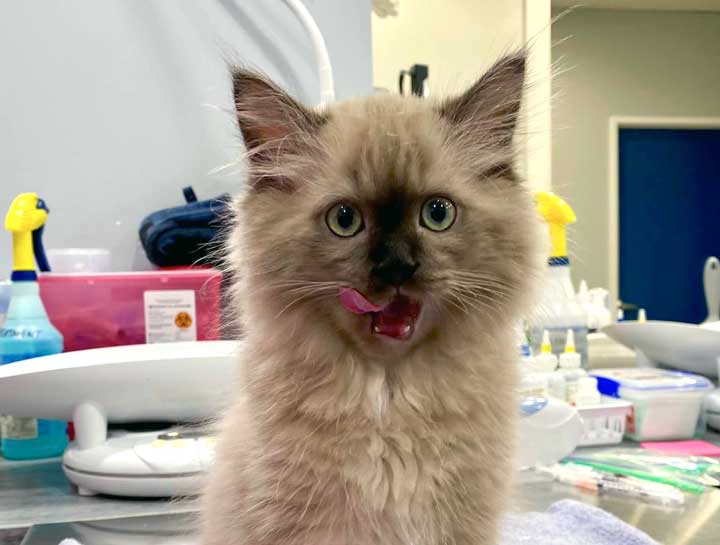Pet Nutrition
Achieve the right nutritional balance.
There are many feline diet recommendations and just as many prescription and non-prescription diets to go along with those recommendations. At our feline veterinary hospital in Issaquah WA, we recommend a simplistic approach to feline diets. To address these recommendations we can list the most frequently asked questions about feline diets in our cat clinic:
- My cat is healthy young (or old), what diet do you recommend? Answer - For healthy felines, we recommend a predator-appropriate diet that is high in protein and low to moderate in fat (based on the calorie requirements for your feline). Research has shown that diets that are high in protein allow predators to stay well hydrated (protein metabolism releases water). Predators like felines are not evolved to metabolize or digest plant ingredients so for our diets we recommend meat products or whole meats with as little fillers as possible.
- I heard that canned foods are the best for cats but that their dental health will decrease (aka their teeth will rot out). Answer - We recommend canned food-heavy (or exclusive) diets for all cats under veterinary care at Meadows Cat Hospital. Canned foods are almost always lower calories than dry foods (best for feline weight control) and high in moisture. Moisture supports feline kidney health a chronic problem that affects most cats by their senior years. The old wives' tale that canned diets lead to dental disease in cats has been widely debunked. As predators, feline teeth are not designed for crunching kibble but rather chewing and teasing out meat. Most cats will crunch kibble once and then swallow whole. While dental formulas may help, they often don't have the recommended protein content so we recommend dental kibble as an occasional treat. For cats, nothing beats regular brushing (for better or worse).
- My cat veterinarian recommended only a low-protein formula for my cat with kidney disease, is this correct? Answer - This is a tricky question and there are two schools of thought. One school of thought is that by limiting dietary protein you can limit the kidney byproducts that build up and thus slow kidney disease. The second school of thought is that if you deprive a cat of protein they will (like most predators) get the protein from their muscle which leads to muscle wasting and the "Skeletor" look of chronic kidney disease cats. Our feline veterinarians believe that these muscle break-down products are much more nephrotoxic (kidney toxic) than dietary protein. At Meadows Cat Hospital, our school of thought is that high-quality (protein source) canned diets available in a diversity of flavors and that are moderate in protein (not low protein) are appropriate for chronic kidney disease cats. Along with the high-quality canned diet, we recommend a phosphate binder like Epakitin to decrease phosphate buildup and head off further kidney damage and resultant nausea. We recommend that cats with chronic kidney disease be allowed to eat whatever type of high-quality canned diet they will eat (kidney disease can lead to nausea and anorexia so the limited flavor availability of kidney diets can be a major issue) and that these cats stand to gain the most from increased fluid intake (from canned foods or fluids) and palliative care for nausea (medications) lead to the best success.
- I heard that fish-based foods can cause hyperthyroidism in cats and likewise are their hyperthyroid diets? Answer - Current research does not support a causation between hyperthyroidism and fish-based cat foods. There is a hyperthyroid diet that requires limiting water sources and snacks that deprive a kitty of iodine. This can be an almost impossible task given the ubiquitous nature of iodine in nature, food, etc.
- My cat is diabetic, should he/she be on a diabetic diet? Answer - Although diabetic and related weight management diets have low glucose, they are generally (especially dry diets) still too high in calories. Caloric intake alone (not just dietary glucose) can contribute to uncontrolled diabetes in cats. Time and again our veterinarians have found that high-quality canned diets (not to sound like a broken record) that are high to moderate in protein and LOW in fat, work much better at controlling blood glucose and weight management. Interestingly, our cat clinic has found a much higher rate of remission and partial remission in cats on canned or transitioned to canned diets. In some cases, through canned diet transitions alone, daily insulin administration was able to be cut upwards of 5-10 fold.
There is no one-size-fits-all feline diet strategy. If you have cat diet questions don't hesitate to call our knowledgeable staff and ask about our veterinary hospital's recommendations. We are always here to help, so call (425) 392-8770 or schedule an appointment online.

